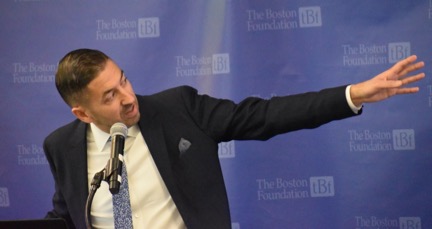The Story of Far-Reaching Health Inequity
Sometimes, says a Boston University dean, differences in health outcomes are about far more than differences in health care
By Sandy Kendall, Communications Manager
"Do social divides kill?"
That’s the provocative—but logical—question posed to a gathering of Boston Foundation partners in the health and wellness arena by guest speaker Dr. Sandro Galea, Dean of the Boston University School of Public Health. Galea addressed participants assembled at the Edgerley Center for Civic Leadership for a networking and idea-sharing retreat, entitled “Working Together to Advance Health Equity.” The event brought together a wide array of medical, health care, community development and social service professionals to sharpen their focus on creating conditions in which everyone can thrive and attain their best health regardless of race, ethnicity, identity or ZIP code.
Boston Foundation Director of Health and Wellness Nineequa Blanding opened the session with a review of some past accomplishments and ongoing initiatives of the Foundation, and then invited attendees to take a social justice lens in approaching their work. In small group discussions, they shared their work, and discuss the importance of focusing on the health equity gap.
The gap isn’t merely about access to services or affordability of care. As Dean Galea emphasized, it is about health, not just health care. He presented data that clearly linked age, gender, income and particularly race to health outcomes. Galea highlighted graphs showing the flatlining earning power of most Americans, declining economic mobility across generations, the persistent wage disparity for people of color and women, and similar race-based gaps in health insurance coverage, home ownership, education and, inversely, incarceration.
The data are convincing. But an analogy Galea shared may be more memorable and compelling: A busy man wants a pet but only has time for a goldfish. He feeds it the top-quality food. He takes it to a prestigious vet. He gives it the proper medications and supplements. And yet, it dies young.
The man never changed the water.
Galea acknowledged that with this particular audience he was largely singing to the choir, and so raised the natural question: What next? How do we change the water? He exhorted them to share widely what they are seeing; to tell the stories that illustrate today’s pervasive health inequities; and to tie them to many other inequities—in even our most thriving economies—that date back centuries. Consider blues singer Blind Willie Johnson, born in 1897 and blinded as a youth in a domestic violence incident. Johnson was made homeless by Jim Crow laws in the 1940s. He was denied hospitalization when he contracted malaria, and died within a year. Did malaria kill him, or did everything else?
These personal stories are as powerful as data to help all of us understand the challenges we face bringing equity to health and health care. As Vice President of Programs Orlando Watkins said in opening the event, “From our seat of privilege and power, we need to work hard to know and be with the communities needing support to close the equity gaps.” By bringing together those working on the front lines every day, the Foundation strives to empower them and strengthen our own understanding and commitment to the cause of health equity.

